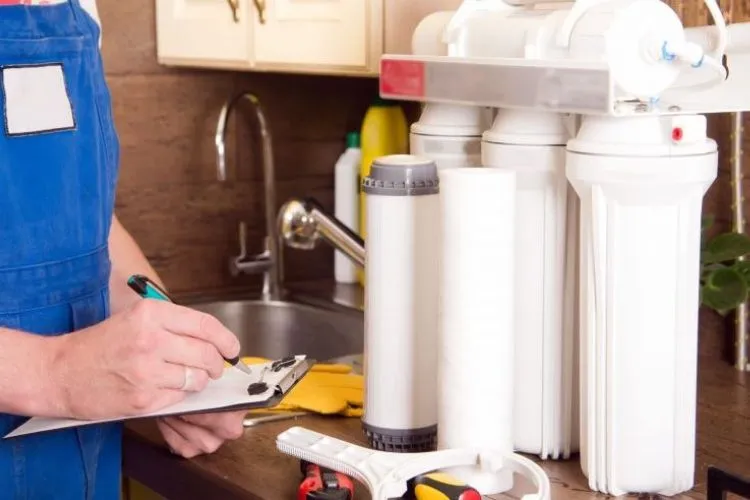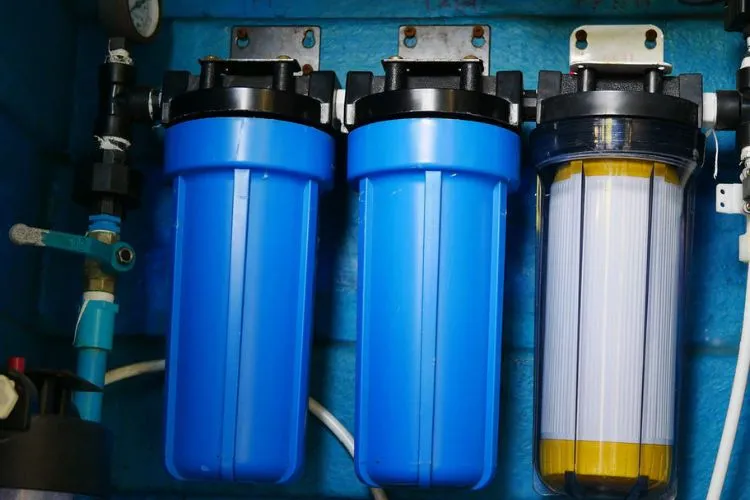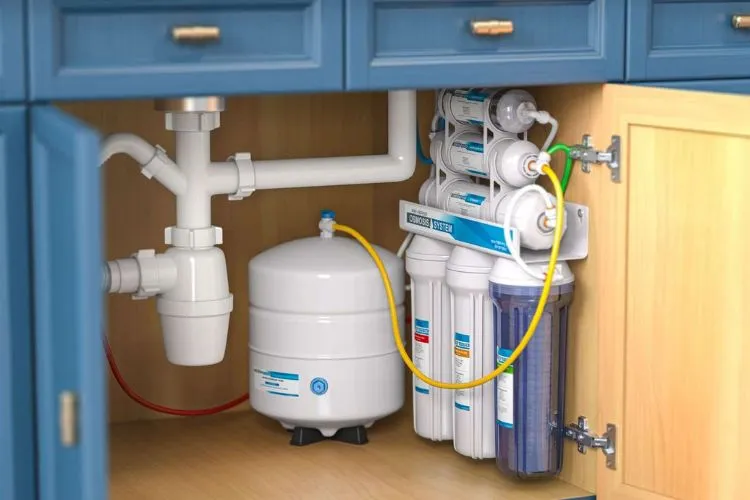The quality of water in our homes is critical for our health, the longevity of our appliances, and overall quality of life. Central to ensuring clean water are systems such as reverse osmosis and water softeners—often discussed but frequently confused.
Homeowners may wonder Are you curious, ‘Is reverse osmosis a water softener?’. Let’s delve into each system to unpack this mystery.

💦 What is Reverse Osmosis?
Reverse osmosis is a water purification technique. It forces water through a semi-permeable membrane. The small pores of the membrane allow water molecules to pass through while blocking larger impurities. Homes use reverse osmosis to improve water taste and remove contaminants.
💦 What is a Water Softener?
Water softeners treat hard water. Hard water contains high mineral content, notably calcium and magnesium.
Water softeners use a process called ion exchange to remove these minerals. Soft water is kinder on household piping and appliances. It also feels smoother during bathing.
💦 Is Reverse Osmosis a Water Softener?
No, reverse osmosis (RO) is not a water softener. RO is a water purification process that removes impurities and contaminants from water by forcing it through a semipermeable membrane.

A water softener, on the other hand, specifically removes minerals that cause water hardness, primarily calcium and magnesium, often using an ion-exchange process.
While RO can reduce mineral content, its primary purpose is broader filtration, and it does not function in the same way as a dedicated water softener.
The Difference Between Reverse Osmosis and Water Softeners
Reverse osmosis and water softeners serve different functions. Reverse osmosis purifies drinking water, removing a broad range of contaminants. A water softener, on the other hand, exchanges minerals for sodium, thus ‘softening’ the water. They work on different aspects of water treatment.
Can Reverse Osmosis Soften Water?
Reverse osmosis does reduce some minerals that cause hardness. Yet it is not a water softener in the traditional sense. The concentration of minerals is lessened, but the principle process is filtration, not ion exchange.
Benefits of Reverse Osmosis Over a Water Softener
When pure drinking water is the goal, reverse osmosis shines. It removes pollutants, chemicals, and even bad tastes and odors. In areas with heavy contamination, a reverse osmosis system is very effective.
Benefits of Water Softeners Over Reverse Osmosis
For homes with hard water, a water softener is essential. It prevents scale buildup in pipes and appliances. This yields long-term savings from reduced wear and tear. Soft water also enhances the effectiveness of soaps and detergents, making cleaning more efficient.
You may also like to find out: What Contaminants Does Water Filtration Remove? An Honest Insight
💦 Do You Need Both a Reverse Osmosis System and a Water Softener?
In some homes, combining both systems may be best. A water softener can protect a reverse osmosis system from mineral clog. This ensures the reverse osmosis system operates efficiently. Having both can address a wide spectrum of water quality issues.

Installation and Maintenance
Installing these systems varies. A professional typically installs a water softener. It requires space and plumbing modifications. Reverse osmosis systems are smaller and often go under a kitchen sink.
Both systems need regular maintenance. Filters and membranes in a reverse osmosis system require replacement. Water softeners need salt refills and occasional resin replacement.
System Longevity and the Water Source
The longevity and maintenance of reverse osmosis systems and water softeners are significantly influenced by the source of the water they treat. Municipal water is typically pre-treated to remove many contaminants and is subject to stringent quality controls.
This reduces the workload on home water purification systems, potentially extending their life and spacing out maintenance needs. Reverse osmosis membranes and pre-filters may have a longer lifespan due to the lower levels of sediments and heavy metals.
Conversely, well water often bears a higher burden of sediments, minerals, and occasionally, bacterial contamination. These elements can clog filters and membranes more quickly, necessitating more frequent service and potentially shortening the lifespan of the system’s components.
For water softeners dealing with well water, the higher mineral content can mean more frequent regeneration cycles and usage of salt, which also contributes to more wear and tear over time.
Homeowners using well water should consider adding pre-treatment steps, such as sediment filters, to safeguard their reverse osmosis and water softening systems.
Regular testing of well water is also essential to monitor for any changes in water quality that might require adjustments to the water treatment system, helping to maintain both its efficiency and longevity.
💦 Frequently Asked Questions (FAQs)
Is it necessary to have a water softener if you have a reverse osmosis system?
If you have hard water, a water softener is necessary for full treatment. However, the reverse osmosis system will also benefit from softer input water.
What are the long-term costs associated with reverse osmosis and water softeners?
Both systems have maintenance costs. Filter replacements for reverse osmosis systems are necessary every 6 to 12 months. Water softeners require regular salt replenishment. However, they can save money long-term by protecting pipes and appliances from hard water damage.
Can reverse osmosis remove minerals as effectively as a water softener?
Reverse osmosis systems reduce mineral content but not as completely as water softeners, designed specifically for this purpose.
What are the environmental impacts of reverse osmosis and water softening systems?
Reverse osmosis systems waste water during the filtration process. Water softeners add sodium to the water supply, which can have environmental impacts. However, both systems can be managed responsibly to limit negative effects.
Conclusion:
Having clear, healthy water in our homes is a cause few would argue against. Reverse osmosis provides excellent water purification. It’s not a water softener but reduces mineral content to a degree.
Households with hard water often need a dedicated water softener. In some cases, a combined approach yields the best outcome.
Understanding the functionalities of reverse osmosis and water softening systems is imperative for making an informed choice about water treatment in your home.
Each has its place, and in some instances, using them in tandem may provide the comprehensive solution you need.

Devon Shorts, a seasoned expert with over a decade of experience in water safety, shares valuable insights on this blog “Aqua Safety Plus”. Trust his expertise to keep your water clean and your family safe.
